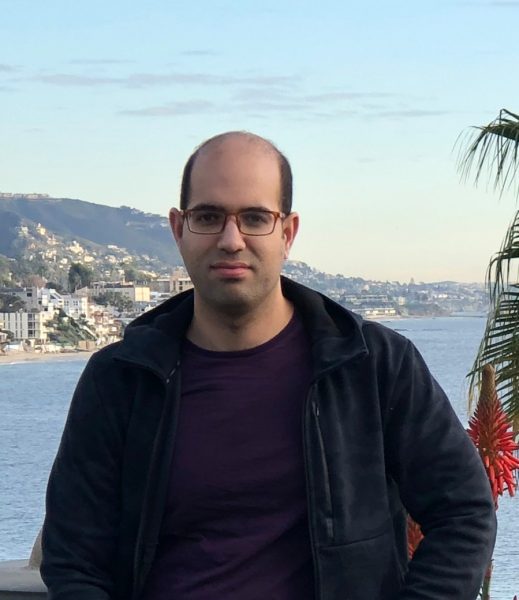Dr. Snehamoy Chatterjee (GMES/ICC-DataS) is the principal investigator (PI) on a project that has received a $288,343 research and development contract from the Department of Health and Human Services, Centers for Disease Control and Prevention, National Institute for Occupational Safety and Health (NIOSH).
The project is titled “Mine Health and Safety Big Data Analysis and Text Mining by Machine Learning Algorithms.”
Aref Majdara (ECE/ICC) is a co-PI on this potential two-year project.
By Kimberly Geiger, College of Engineering, June 8, 2021
Michigan Technological University has joined the Power Systems Engineering Research Center (PSERC) — a collaboration of university and industry members.
“We are very pleased to be members of PSERC, where our researchers can combine efforts with other members to creatively address key challenges in creating a modern electric energy infrastructure,” stated Janet Callahan, dean of Michigan Tech’s College of Engineering. “Michigan Tech will be the 13th university in the partnership, and will bring three new industry partners into PSERC,” she added.
Those partners are DTE, Consumers Energy and Hubbell. The full list of member universities is available on the PSERC website.
“The overall goal of joining PSERC is to catalyze transdisciplinary research by teaming up with other institutions and relevant industry partners for national grant competition,” said Chee-Wooi Ten, associate professor of electrical and computer engineering at Michigan Tech. Ten will serve as Michigan Tech’s PSERC site director.
Started as a National Science Foundation (NSF) Industry-University Cooperative Research Center (IUCRC), PSERC began in 1996 and was first led by Cornell professor Robert J. Thomas, and then Vijay Vittal of Arizona State University. Today PSERC is directed by Kory W. Hedman, professor of electrical and computer engineering at Arizona State University.

PSERC member expertise includes power systems, applied mathematics, complex systems, computing, control theory, power electronics, operations research, nonlinear systems, economics, industrial organization and public policy.
Michigan Tech brings much to the research collaborative, said Callahan, particularly in key areas of power systems engineering, social sciences and, most importantly, computing involved heavily in data science and cybersecurity. Cross-disciplinary interaction will be encouraged and expected, for example, with the University’s Department of Applied Computing where Ten holds an affiliated faculty position and where Hubbell is a member of the departmental industrial advisory board.
Membership in PSERC will enable Michigan Tech to apply for seed grants together with other PSERC universities. Ten envisions Michigan Tech faculty members submitting seed grant proposals annually. “PSERC membership will enable Michigan Tech to go beyond its traditional research boundaries,” he said. “Historically, power area research at Michigan Tech focuses on the metering of electrical loads met by generation. We’ll see more opportunities that involve the intersection of new cross-disciplinary areas.”
PSERC grants can also fund graduate student research, noted Callahan. “Any faculty member at Michigan Tech can submit proposals, but this is especially good news for assistant professors and other new faculty members seeking to establish a research program,” she said. “This aligns with our institutional Tech Forward initiatives and University vision to grow to 10,000 students, especially our graduate student population.”
Members of PSERC typically meet in person three times per year with the PSERC Industrial Advisory Board (IAB). This meeting provides a regular opportunity to build new and productive partnerships among faculty and students from other PSERC universities as well as with industrial partners.
“These meetings are unparalleled, a regular opportunity to meet and mingle with energy researchers from other PSERC institutions. We’ll be able to brainstorm and discuss possible collaborations,” said Ten. “I am also very pleased to work with Kory Hedman, the new director of PSERC.”
“While we are now part of the PSERC ecosystem that allows us to submit proposals, the work has only just begun,” Ten concluded. “I am looking forward to working with our PSERC members and creating value with Michigan Tech’s research strengths.”
View the original article here.
Michigan Technological University is a public research university, home to more than 7,000 students from 54 countries. Founded in 1885, the University offers more than 120 undergraduate and graduate degree programs in science and technology, engineering, forestry, business and economics, health professions, humanities, mathematics, and social sciences. Our campus in Michigan’s Upper Peninsula overlooks the Keweenaw Waterway and is just a few miles from Lake Superior.
by Allison Mills, University Marketing and Communications

A major challenge for fully autonomous vehicles is navigating bad weather. Snow especially confounds crucial sensor data that helps a vehicle gauge depth, find obstacles and keep on the correct side of the yellow line, assuming it is visible. Averaging more than 200 inches of snow every winter, Michigan’s Keweenaw Peninsula is the perfect place to push autonomous vehicle tech to its limits.
In two papers presented at SPIE Defense + Commercial Sensing 2021, researchers from Michigan Technological University discuss solutions for snowy driving scenarios that could help bring self-driving options to snowy cities like Chicago, Detroit, Minneapolis and Toronto.
The team includes Nathir Rawashdeh and doctoral student Abu-Alrub (CC) as well as Jeremy Bos and student researchers Akhil Kurup, Derek Chopp and Zach Jeffries (ECE).
Read more about their collaborative mobility research on mtu.edu/news.
This MTU news story was published by Science Daily, TechXplore, Knowridge Science Report and other research news aggregators.

Dr. Ali Yekkehkhany, a postdoctoral scholar at the University of California, Berkeley, will present a talk on Thursday, May 6, 2021, at 3:00 p.m.
He will discuss adversarial attacks on the computation of reinforcement learning and risk-aversion in games and online learning.
Dr. Yekkehkhany’s research interests include machine/reinforcement learning, queueing theory, applied probability theory and stochastic processes.
Talk Title
Adversarial Reinforcement Learning, Risk-Averse Game Theory and Online Learning with Applications to Autonomous Vehicles and Financial Investments
Talk Abstract
In this talk, we discuss:
- a) Adversarial attacks on the computation of reinforcement learning: The emergence of cloud, edge, and fog computing has incentivized agents to offload the large-scale computation of reinforcement learning models to distributed servers, giving rise to edge reinforcement learning (RL). By the inherently distributed nature of edge RL, the swift shift to this technology brings a host of new adversarial attack challenges that can be catastrophic in safety-critical applications. A natural malevolent attack could be to contaminate the RL computation such that the contraction property of the Bellman operator is undermined in the value/policy iteration methods. This can result in luring the agent to search among suboptimal policies without improving the true values of policies. We prove that under certain conditions, the attacked value/policy iteration methods converge to the vicinity of the optimal policy with high probability if the number of value/policy evaluation iterations is larger than a threshold that is logarithmic in the inverse of a desired precision.
- b) Risk-aversion in games and online learning: The fast-growing market of autonomous vehicles, unmanned aerial vehicles, and fleets in general necessitates the design of smart and automatic navigation systems considering the stochastic latency along different paths in a traffic network. To our knowledge, the existing navigation systems including Google Maps, Waze, MapQuest, Scout GPS, Apple Maps, and others are based on minimizing the expected travel time, ignoring the path delay uncertainty. To put the travel time uncertainty into perspective, we model the decision making of risk-averse travelers in a traffic network by an atomic stochastic congestion game and propose three classes of risk-averse equilibria. We show that the Braess paradox may not occur to the extent presented originally and the price of anarchy can be improved, benefiting the society, when players travel according to risk-averse equilibria rather than the Wardrop/Nash equilibrium. Furthermore, we extend the idea of risk-aversion to online learning; in particular, risk-averse explore-then-commit multi-armed-bandits. We use data from the New York Stock Exchange (NYSE) to show that the classical mean-variance and conditional value at risk approaches can come short in addressing risk-aversion for financial investments. We introduce new venues to study risk-aversion by taking the probability distributions into account rather than the summarized statistics of distributions.
Biography
Ali Yekkehkhany is a postdoctoral scholar with the Department of Industrial Engineering and Operations Research, University of California, Berkeley. He received his PhD and MSc degrees in Electrical and Computer Engineering from the University of Illinois, Urbana-Champaign (UIUC) in 2020 and 2017, respectively, and BSc degree in Electrical Engineering from Sharif University of Technology in 2014.
He is the recipient of the “best poster award in recognition of high-quality research, professional poster, and outstanding presentation” in the 15th CSL Student Conference, 2020, and the “Harold L. Olesen award for excellence in undergraduate teaching by graduate students” in the 2019-2020 academic year at UIUC. He was chosen as “teachers ranked as excellent” twice and “teachers ranked as excellent and outstanding” twice at UIUC.
His research interests include machine/reinforcement learning, queueing theory, applied probability theory and stochastic processes.

Dr. Dukka KC, Electrical Engineering and Computer Science, Wichita State University, will present a talk on Wednesday, May 5, 2021, at 3:00 p.m.
Dr. KC will discuss some past and ongoing projects in his lab related to machine learning/deep learning-based approaches for an important problem in Bioinformatics: protein post-translational modification.
Talk Title
Bioinformatics as an emerging field of Data Science: Protein post-translation modification prediction using Deep Learning
Talk Abstract
In this talk, I will be presenting about some of the past and ongoing projects in my lab especially related to Machine Learning/Deep Learning based approaches for one of the important problems in Bioinformatics – protein post-translational modification.
Especially, I will focus on our endeavors to get away from manual feature extraction (hand-crafted feature extraction) from protein sequence, use of notion of transfer learning to solve problems where there is scarcity of labeled data in the field, and stacking/ensemble-based approaches.
I will also summarize our future plans for using multi-label, multi-task and multi-modal learning for the problem. I will highlight some of the ongoing preliminary works in disaster resiliency. Finally, I will provide my vision for strengthening data science related research, teaching, and service for MTU’s college of computing.
Biography
Dr. Dukka KC is the Director of Data Science Lab, Director of Data Science Efforts, Director of Disaster Resilience Analytics Center and Associate Professor of Electrical Engineering and Computer Science (EECS) in the Department of EECS at Wichita State University. His current efforts are focused on application of various computing/data science concepts including but not limited to Machine Learning, Deep Learning, HPC, etc. for elucidation of protein sequence, structure, function and evolution relationship among others.
He has received grant funds totaling $4.25M as PIs or Co-PIs, spanning 17 funded grants. He was the PI on the $499K NSF Excellence in Research project focused on developing Deep Learning based approaches for Protein Post-translational modification sites.
He received his B.E. in computer science in 2001, his M.Inf. in 2003 and his Ph.D. in Informatics (Bioinformatics) in 2006 from Kyoto University, Japan. Subsequently he did a postdoc at Georgia Institute of Technology working on refinement algorithms for protein structure prediction. He then moved to UNC-Charlotte and did another postdoc working on functional site predictions in proteins. He was a CRTA Fellow in National Cancer Institute at National Institutes of Health where he was working on intrinsically symmetric domains.
Prior to his arrival at WSU, he was associate professor and graduate program director in the Department of Computational Science and Engineering at North Carolina A&T State University.
Dr. KC has published more than 30 journal and 20 conference papers in the field and is associate editor for two leading journals (BMC Bioinformatics and Frontiers in Bioinformatics) in the field. He also dedicates much of his efforts to K-12 education, STEM workforce development, and increasing diversity in engineering and science.